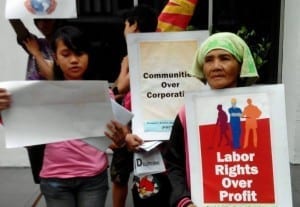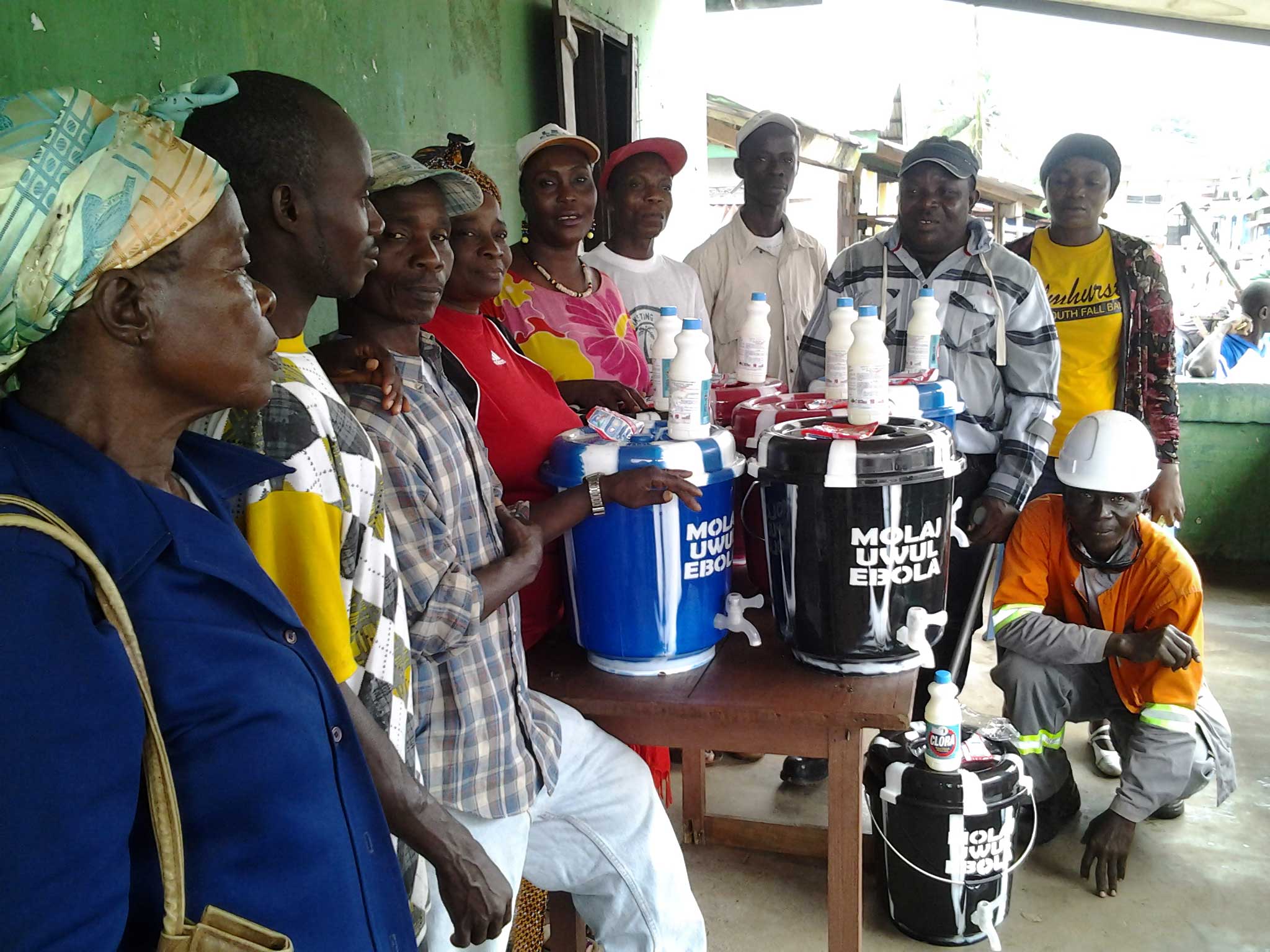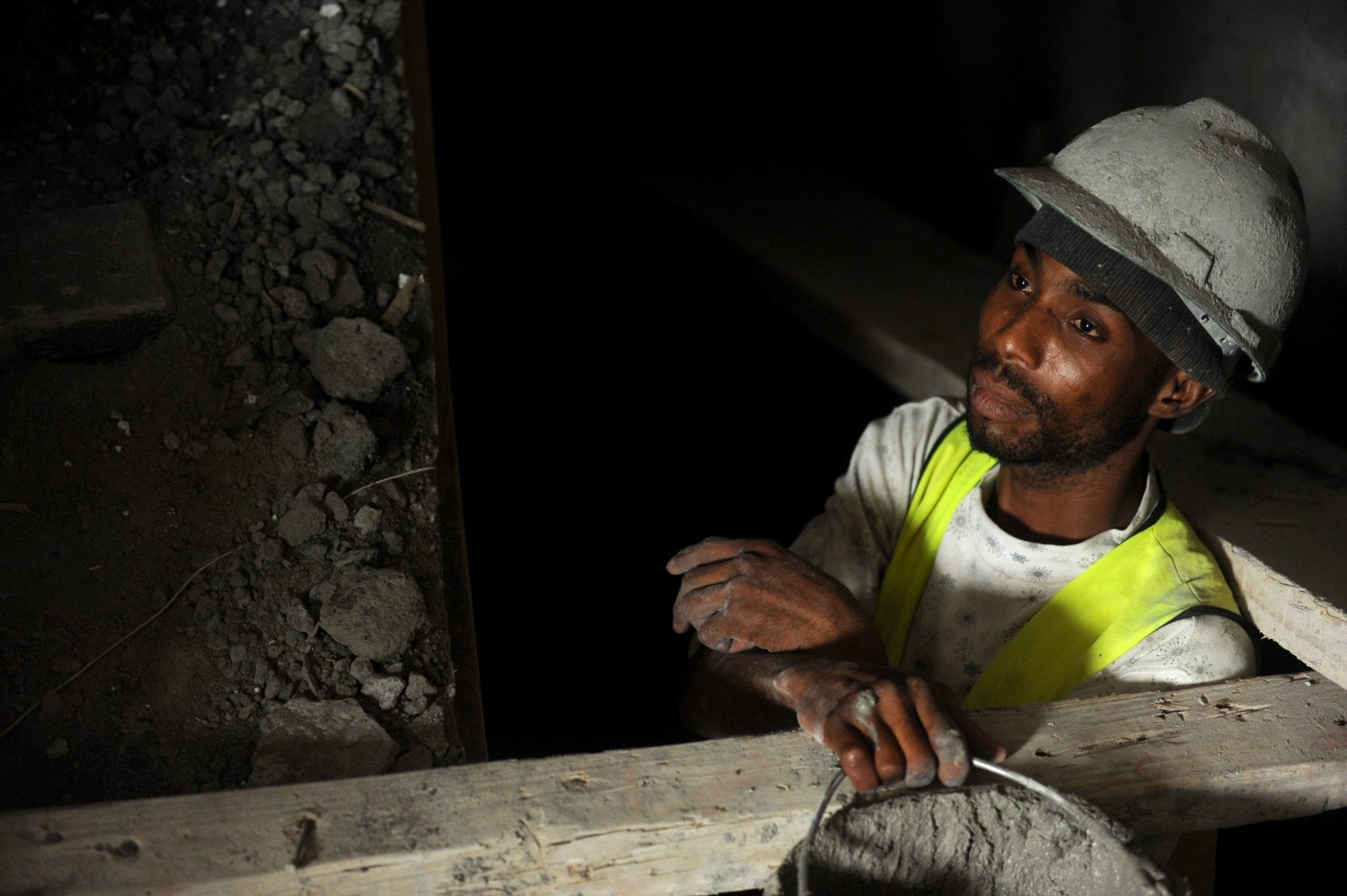Oct 31, 2014

Workers from three union federations waged a general strike in Morocco. Credit: IndustriALL
Thousands of workers in Morocco’s three trade union federations waged a general strike Wednesday to protest the government’s refusal to discuss fundamental worker issues such as working conditions, pensions and other benefits.
manufacturing, commerce and agriculture, along with private-sector employees, took to the streets after many attempts to engage the government in collective bargaining.
The first-ever joint strike involving the Confédération Démocratique du Travail (CDT), the Union Marocain du Travail (UMT) and the Fédération Démocratique du Travail (FDT) highlighted worker frustration with the lack of dialogue. Workers also protested the government freezing salaries and benefits while raising taxes. The economic squeeze is exacerbated by the skyrocketing cost of consumer goods.
Workers also called out corporations for their selective application of Morocco’s labor code, saying many employers only abide by a few provisions and ignore key regulations such as those covering workplace health and safety and medical coverage.
The workers are demanding the government:
• Decrease taxes on wages and consumption,
• Retract the law that criminalizes union activity,
• Provide citizens with adequate public services,
• Guarantee secure and stable employment and cease hiring workers for precarious subcontracted or temporary jobs,
• End ongoing freedom of association violations, which include dismissing union leaders and firing large numbers of workers, and
• Address the concerns of retired workers struggling to survive on pensions.
Read the full list of demands in French and Arabic.
Oct 31, 2014
Workers across Asia are taking to the streets this fall with protests against proposed World Bank policies that fall short of ensuring fundamental worker rights, like freedom of association and collective bargaining.

Worker right activists rallied outside World Bank meetings in the Philippines this fall. Credit: Alyansa Tigil Mina
In July, the World Bank released drafts of its revised Environmental and Social Safeguard Policies, a set of guidelines aimed to ensure that World Bank-funded projects do not harm communities or the environment.
The proposed safeguards for the first time would include a section on labor. But unlike international finance institutions such as the European Bank for Reconstruction and Development, the World Bank would not require borrowers to adhere to International Labor Organization (ILO) core labor standards. Further, labor protections would extend only to workers employed directly by borrowers and exclude all employees of contractors or sub-contractors, who generally account for the vast majority of workers on World Bank-funded projects.
“The current draft of the safeguards … leaves especially vulnerable workers open to exploitation and abuse,” AFL-CIO President Richard Trumka said, noting that contract workers already disproportionately suffer from discrimination and unsafe working conditions.
Other proposed safeguards also fall short. As the AFL-CIO notes, “there is no enforceable provision to protect human rights, troubling exceptions to protections for indigenous rights and no clear process or procedure for individuals and communities seeking redress if things go wrong.”
Although the World Bank is consulting with governments, corporations and some non-governmental organizations, activists say the most vulnerable people—such as informal economy workers and indigenous populations—have been left out of the discussions.
“Instead of creating safeguards that favor corporations, what we actually need are provisions that will empower and strengthen the bodies that make up the labor forces. We don’t see that in the draft that is being circulated right now,” said Edsil Bacalso, coordinator of NAGKAISA, a network of labor groups in the Philippines and a Solidarity Center ally.
During a World Bank meeting discussing the safeguards in Washington, D.C., this month, a coalition of activists advocating for workers, human rights and the environment presented a statement signed by more than 170 groups demanding the safeguards be strengthened. As Soumya Dutta from the Indian Peoples’ Science Campaign read the coalition statement, activists in the audience took off jackets to reveal t-shirts saying: “Safeguard people and the planet, not corporate profits and human rights abuses!”
Solidarity Center staff from Thailand, Indonesia and Washington, D.C., took part in a forum in September to help craft the statement’s section on labor. Worker rights activists say that if the World Bank adopts the safeguards as currently written, it would set off a cascading effect, spurring multilateral development banks to weaken their labor requirements for borrowers and harming workers.
Activists are holding rallies around the world, including in Bangladesh, India ad Japan, timed to coincide with World Bank meetings in each country on the proposed safeguards. The World Bank is seeking to present the final draft safeguards during its meeting next fall.

Oct 23, 2014
Union members across Liberia have taken the lead in Ebola education and prevention among workers and their families, holding awareness trainings for thousands of workers and supplying them with hand-washing buckets and sanitation cleansers donated in part through the Solidarity Center West Africa Ebola Fund.
At the Firestone Natural Rubber Plantation in Margibi County, where more than 11,000 full-time and precarious workers labor, and where 75,000 people live in 125 Firestone camps and in nearby communities, the Firestone Agricultural Workers Union (FAWUL) leaders and shop-stewards have so far reached 1,337 people in eight camps with protective equipment and information. FAWUL is a longtime Solidarity Center ally.
Working with the Movement for Labor Rights & Justice (MOLAJ), a nongovernmental organization, FAWUL has distributed 191 chlorine-filled hand-washing buckets. FAWUL members living in the area are closely monitoring use of the buckets, are teaching community members how to mix the water and chlorine, and encouraging them to replenish the chlorine when it runs out. The buckets are placed where people frequently gather, such as at community water pumps, and distributed to households with more than eight occupants.
Among workers at ArcelorMittal Liberia (AML), the United Workers’ Union of Liberia (UWUL) and UWUL Local 4, together with MOLAJ, reached 750 people through labor’s Ebola awareness and preventive measures campaign, providing 50 hand-washing buckets in communities in the Buchanan area, where a majority of AML workers live. UWUL, also a Solidarity Center ally, reached 21 disabled workers and 35 sight-impaired workers with awareness and prevention training, providing hand-washing buckets and $100 from the local union to replenish the chlorine.
Elsewhere, the Dockworkers Union (DOWUL) is reaching out to workers in Monrovia’s port; the General Agricultural and Allied Workers’ Union of Liberia (GAAWUL) has held education trainings for nearly 1,000 workers and their families living in camps at the Sime Darby Rubber and Oil Palm Plantations; and UWUL also is engaging workers at the Putu Iron Ore Mining company.
Liberia accounts for more than half of all the official Ebola deaths, nearly 2,500, and some reports indicate that figure is much higher. Women in Liberia—because of their roles as caregivers and their work in precarious informal economy jobs and as health care workers—are overwhelmingly affected: Up to 75 percent of people killed by Ebola have been women. Children orphaned by the disease often are left alone to survive in the street.

Oct 23, 2014
The Inter-American Court for Human Rights ordered the Dominican Republic to reform all national laws blocking the recognition of citizenship for children of undocumented parents born in the country.
The decision, dated August 28, 2014, was made public on October 22, 2014, according to a story today in El Dia, a national newspaper in the Dominican Republic. The sentence orders the country to adopt the necessary measures to ensure no laws or rules deny Dominican nationality to children born in the country to undocumented parents who migrated there.
The decision comes in a case in which 27 people were deported, five of them Haitian children residing in the Dominican Republic and 22 of whom were found to be Dominicans.
“The Court found the existence, at least for a period of around one decade after 1990, a systematic pattern of expulsions, including through collective acts of Haitians and people of Haitian descent, which reflects a discriminatory conception,” according to El Dia, quoting the court statement. The Inter-American Court for Human Rights is part of the Organization of American States.
In September 2013, the Dominican Republic’s Constitutional Court revoked the citizenship of individuals born in the country since 1929 who could not prove their parents’ regular migration status.
The ruling would have barred such individuals from any activity that required official identification, including working in the formal sector, attending school, opening a bank account, paying into retirement or social security funds, accessing health services, getting married, traveling or voting, according to an AFL-CIO and Solidarity Center report.
Further, it disproportionately affected individuals of Haitian descent living and working in the Dominican Republic.
Hailing the court decision, Geoff Herzog, Solidarity Center Dominican Republic country program director, said, “the Solidarity Center joins with our union allies and with our allies in the migrant support community in defense of migrant worker rights.
“We support recognition of citizenship for Dominicans of Haitian descent who are blocked from citizenship and therefore, are denied their basic human and labor rights.”
Oct 22, 2014
In Limpopo, a landlocked rural area in South Africa’s northernmost province, agriculture and mining are the primary industries, nearly 75 percent of residents fall below the country’s poverty line and many cling to long-held cultural and religious biases. In this difficult environment, workers who identify as LGBTI (lesbian, gay, bisexual, transgender and intersex) face frequent discrimination at the workplace, even though it is prohibited under the South African Constitution.
“Discrimination is bad—employers want us to dress a certain way, they want us to pretend to be what we are not,” said one young lesbian member of the Limpopo LGBTI group, Proudly Out. “I am seen as a demon.”
The worker was among 60 participants in a recent dialogue session, “LGBTI Rights in the Workplace,” organized by WageIndicator.org sponsors, the Solidarity Center, the Labour Rights for Women and others.
The discussion in Polokwane, Limpopo’s capital, included LGBTI workers and union leaders from South Africa’s four labor federations: the Congress of South African Trade Unions (COSATU), the National Council of Trade Unions (NACTU), the Confederation of South Africa Workers’ Unions (CONSAWU) and the Federation of Unions of South Africa (FEDUSA).
Members of the LGBTI community spoke of not being taken seriously in interviews for jobs because they did not look “conventional.” Some said they were prohibited by their employer from taking time off work to care for a partner, a right guaranteed under the country’s Family Responsibility Leave policy. Others described being called names and being shunned by colleagues in spaces such as workplace bathrooms.
The low level of information about the LGBTI community in Limpopo results in prejudice and makes it difficult for LGBTI workers to access their constitutional rights in the province and in their respective communities, according to Nhlanhla Mabizela, Solidarity Center program officer for gender in South Africa.
Further, some members of the LGBTI community, particularly those in rural areas, do not know how to access their rights, according to a representative of the South African Commission for Gender Equality who also took part in the forum, along with the Labour Research Service.
The meeting also highlighted the need for more awareness among unions about the struggles of LGBTI workers so they could effectively stand up for LGBTI issues at work. Federation leaders agreed to hold similar LGBTI education and dialogue meetings with their local unions to help ensure LGBTI rights were recognized at the workplace and during contract negotiations.
The meeting in Limpopo is the third such LGBTI dialogue spearheaded by the WageIndicator.org’s Labour Rights for Women campaign in South Africa, as it works with trade unions and other civil society organizations to reverse the conditions that led one LGBTI participant to say: “We are hated for being who we are.”




